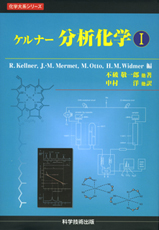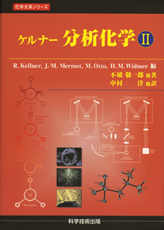|
|
|
 |
|
 |
 |
|
| ケルナー 分析化学 I & II(科学技術出版) |
|
Kellner, Mermet, Otto, Widmer 編著
中村 洋 監訳 |
|
A5判/I:600頁 II:500頁
価格:本体24,000円+税(2巻セット・分売不可)
ISBNコード:4-87653-250-8 |
|
|
|
 |
|
|
「ケルナー 分析化学」は、分析化学(Analytical Chemistry )分野での「世界標準」教科書の決定版であり、本書の出版前より既に世界的に話題となっており、この分野におけるバイブルとも言える地位を本書の原本出版と同時に確立した。 |
|
書評・「ケルナー 分析化学」
お茶の水女子大学理学部化学科教授 藤枝修子
Analytical Chemistry (1998, Wiley-VCH)
Ed. by R. Kellner, J.-M. Mermet, M. Otto, H. M. Widmer
大学の学部レベルで分析化学の分野で使われている教科書を見ると、化学平衡などの基礎的事項、機器分析などでそれぞれかなりの種類が出版されている。しかし、物理化学や有機化学などのように採用数が他をぬきんでたベストセラーがほとんど見当たらないように思われる。
四半世紀前から、Federation of European Chemical Societies (FECS) がつくられ、化学教育と分析化学の分野でDivision の活動をしてきた。物理科学のなかでは、最近のところ分析化学が最も劇的な発展をとげた。分析手法も急増し、精巧になり、応用分野も大幅に増えた。学部レベルの教育にどのように、どの程度取り入れたらよいかの難問をかかえてきた。Division of Analytical Chemistry では、充分な調査の結果、Eurocurriculum を検討し、ヨーロッパや海外からも賛意を表する反響をえている。
本書は世界的レベルで分析化学のカリキュラムを実施するための教科書である。本書では、理論的背景、実験および機器に関する詳細、応用を通して、問題解決に必要な分析化学的思考に導くことを最終目標としている。
はじめにも述べたように、日本の先生方が日本語で日本の学生達のために書き下ろした分析化学の書物は「痒いところに手が届く」ように明快な解説がなされていて、何ら不満があるわけではない。しかし、21世紀を目前にして、最近のインターネットなどの普及率や、学生諸兄姉がこれら技術を使いこなすようになる速さの凄まじさを考えると、この世界レベルで書き下ろされたEurocurriculum に日本の学生達が立ち遅れることにでもなれば、将来的に日本の分析化学、科学技術に遅れをとることになるのではないかと危惧するものである。幸いに(株)科学技術出版から日本語で読めるように翻訳の提案が出された。東京理科大学の中村洋教授のもとで、37名の専門家を動員しての作業が始まっている。学部学生だけでなく、他分野の専門家でも、分析化学の基礎レベルを習得する必要があるときは、座右において、ぜひ有効に役立てて欲しいものである。
監修者集団は国籍が異なる4名で、R. Kellner(オースリア), J.-M. Mermet(フランス), M. Otto(ドイツ), H. M. Widmer(スイス)により構成している。著者は30名からなる。以下に著者名、国名と執筆担当箇所をカッコ内に示す(このあとの章ごとの簡単な紹介と対応されたい)。
Holger Becker, UK (Chap. 15); Jack Beconsall, UK (Section 9.3); KarlCammann, Germany (Section 1.1); Gary D. Christian, USA (Chap. 16); PierreVan Espen, Belgium (Section 8.3); Horst Friebolin, Germany (Section 9.3);Gernot Friedbacher, Austria (Chap. 10); Keiichi Fuwa, Japan (Section 1.2);Jeanette G. Grasselli, USA (Section 1.3); Manfred Grasserbauer, Austria(Chap. 10); D. Bernard Griepink, Belgium (Chap. 3); Elizabeth A. H. Hall,UK (Sections 7.8 & 7.9); Elo H. Hansen, Denmark (Section 7.4); Robert A.Kellner, Austria (Sections 1.1, 7.1, 7.2, 7.6, 9.1, 9.2, Appendix 5);viliam Krivan, Germany (Section 8.4); Willem E. van der Linden, TheNetherlands (Section 2.1-2.3); Eddie A. Maier, Belgium (Chap. 3); AndreasManz, UK (Chap. 15); Jean-Michel Mermet, France (Sections 8.1, 8.2, 8.5,Appendix 4); Wilfried M. A. Niessen, The Netherlands (Section 9.4); LauriNiinistoe, Finland (Section 7.5); Matthias Otto, Germany (Sections 5.1-5.5,7.7, 12.4, 12.5, Chap. 13, Appendices 1, 3. 6 & 79; Dolordes Perez Bendito,Spain (Chap. 6); Erwin Rosenberg, Austria (Chap. 14); William S. Sheldrick,Germany (Chap. 11); Klara Toth, Hungary (Sections 4.4 & 7.3); wolfhardWegscheider, Austria (Sections 12.2 & 12.3); H. Michael Widmer, Switzerland(Sections 4.1-4.3, 4.5, 5.6, 7.1 & 7.2); E. deniz Yalvac, USA (Chap. 16);Pier Giorgio Zambonin, Italy (Sections 2.4 & 12.1). |
|
本書は、次の点を目的に出版された:
To offer chemistry students worldwide a cohesive, clearly structured overview of analytical chemistry. Modern, stimulating and completely up-to-date.
This is a book with committed supporters:
Analytical Chemistry is the offspring of the Division of Analytical Chemistry (DAC) of the Federation of European Chemical Societies. Experts who care about future experts
... and with illustrious authors:
Contributors of international stature and impressive background include
K. Cammann (Germany), G. D. Christian (USA), P. Van Espen (Belgium), H. Friebolin (Germany), K. 不破 (日本), J. G. Grasselli (USA), M. Grasserbauer (Austria), D. B. Griepink (Belgium), E. A. H. Hall (U.K.), E. H. Hansen (Denmark), V. Krivan (Germany), W. E. van der Linden (The Netherlands), A. Manz (U.K.), W. M. A. Niessen (The Netherlands), L. Niinist? (Finland), D. P屍ez Bendito (Spain), W. S. Sheldrick (Germany), K. T?h (Hungary), W. Wegscheider (Austria), P. G. Zambonin (Italy). Each of these names is an endorsement of the quality and authority of Analytical Chemistry.
Richly illustrated, learning objectives precede each chapter. Numerous problems and worked examples help students develop a solid understanding of the material covered. This textbook covers everything that the aspiring analytical chemist needs to know: from sampling, quality assurance, chemical analysis, sensors, spectroscopic methods, to chemometrics and applications of total analysis systems to real problems.
主要内容
Part I General Topics
1 Aims of Analytical Chemistry and its Importance for Society
Aims of Analytical Chemistry/ Basic Importance of AC for Society/ The Analytical Chemist as a Problem Solver
2 The Analytical Process
Introduction/ The Total Analytical Process/ Performance Characteristics/ Errors in Analytical Chemistry
3 Quality Assurance and Quality Control
Part II Chemical Analysis
4 Fundamentals of Chemical Analysis
The Equilibrium State of Homogeneous and Heterogeneous Systems/ Acid-Base Equilibria/ Complex Formation/ Redox Systems
5 Chromatography and other Modern Separation Techniques
Gas Chromatography/ Liquid Chromatography/ Supercritical Fluid Chromatography and Electrophoresis/ Field Flow Fractionation
6 Kinetics and Catalysis
7 Methods and their Applications
Titrimetry/ Gravimetry/ Electroanalysis/ Flow Injection Analysis/ Thermal Analysis/ Organic Elemental Analysis/ Chemical Sensors/ Biosensors/ Immunoassay
Part III Physical Analysis
8 Element Specific Analysis
Atomic Emission Spectrometry/ Atomic Absorption Spectrometry/ X-Ray Fluorescence Spectrometry/ Activation Analysis/ Inorganic Mass Spectrometry
9 Compound and Molecule-Specific Analysis
UV-VIS-Spectrometry/ IR and Raman Spectrometry/ Nuclear Magnetic Resonance (NMR) Spectrometry/ Analytical Mass Spectrometry
10 Microbeam and Surface Analysis
11 Structure Analysis
Part IV Computer-Based Analytical Chemistry (COBAC)
12 Chemometrics
Basic Statistic/ Calibration/ Signal Processing/ Optimization and Experimental Design/ Multivariate Methods
13 Computer Hard- and Software and Interfacing Analytical Instruments and Computers
Part V Total Analysis Systems
14 Hyphenated Systems
15 Miniaturized Analytical Systems
16 Process Analytical Chemistry |
|
|